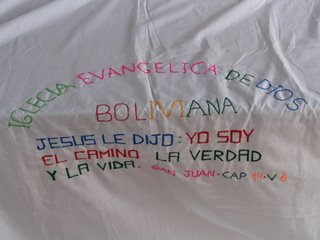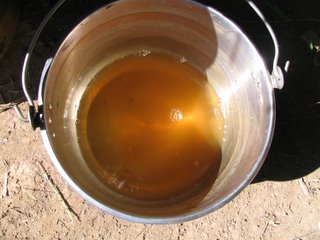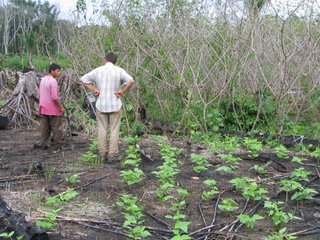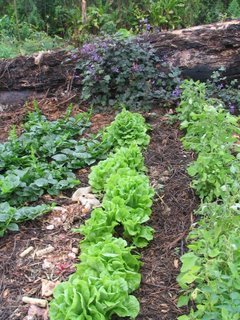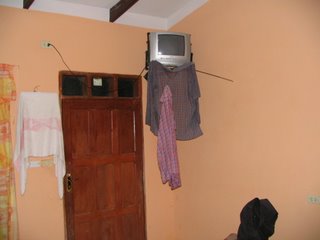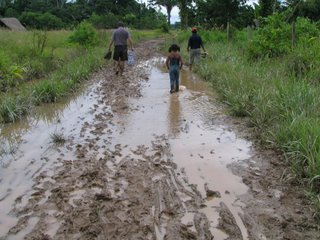The main ‘user’ of the road is the lumber company. An agreement was made that the company could use the road provided it would build the road and maintain it. The company built the road by cutting a swath with a cat through the forest and they maintain it by driving on it. Logs cut from farmers’ fields are hauled day and night while the weather is good. But there is a problem. All this driving puts holes in the road and when it rains, the holes get deeper since the trucks drive straight through. After some time the road is nothing but potholes and the community decides to stop all traffic until the road is repaired.
This is the problem with which we were faced in November. We could understand why when the road was wet since we could see the damage. Even though our truck is light we still try to be considerate of the community. But when the road was dry we became quite frustrated – until we realized what was happening.
One day I returned from Yapacani after attending a meeting there. The weather was fine and I did not anticipate any problems. But when I came to the entrance of Patajusal 1 the trunca was closed. I had taken some people with me and they checked at a couple places for the key but were unable to find it. I walked to the school and the store but at neither place did I find the key. So what do I do – turn around and go all the way back to Yapacani or stay in Hotel Chevrolet for the night? The people from the community are always warning me that it us unsafe to drive at night but does that include sleeping in the truck in the middle of nowhere? Let’s just say that I have spent much more comfortable nights. The next morning I returned to one of the places where I was told the key would be. They had returned from the field the night before and they gave me the key after making me promise to bring it back as soon as I opened the gate and also promise that I would not let anyone else through. I was home in time for breakfast and a nap!
Another day we were expecting some supplies for the workshop and had obtained permission for this truck to enter. We received the key with the usual conditions of letting no one else through. When I arrived at the gate the truck was there as well as the road grader. But the man from the road grader, who happened to work for the lumber company, would not allow me through the gate. After some very frustrating conversation, I went home and told Jake to deal with the problem. He went to the gate and negotiated that the truck could come through in one hour. Part of the problem was that I was a woman and there is no way that a man will let a woman tell him what is going on. And then when I had the key, there was no recourse except to stick to his guns. When Jake came, things could be negotiated. It was at this time that we realized that there was some serious negotiating being done with the lumber company. The company wanted to grade the road even though there were wet spots and the community leaders wanted them to wait. From that time on, one of the members of the community was assigned to stay by the trunca and open it for those who were allowed to pass through but to keep the lumber company from moving trucks. We appreciated that since we did not have to look for a key every time we went in and out of the community.
The road has now been ‘fixed’ in Patajusal 1. They raised it so that water does not run over it as quickly, but it is still made of clay which causes great problems when it is wet. It is not unusual for the micro (the bus that provides public transportation) to be stuck somewhere on the road. One night we were coming back and made sure that we were at the trunca when the micro would come through. It had been a bit wet but we were sure that we could make it. After a couple hours of waiting we were told that we could only go to one of the farms but we would have to wait there until morning. However, the micro could go through. So we stopped at the farm and Jake stopped the micro so that we could get a ride. Then the people on the bus decided that we could go down the road after the bus. So off we went – for a few hundred meters. Then the micro decided that it could go no further and would back down the road. Then we could go – if we took the people and the cargo. Although we were loaded down much heavier than we wanted, we agreed and we were able to make it to our own beds. Not another night in Hotel Chevrolet!!
But now we have another problem. The road is fixed in Patajusa
 l 1 and they have started construction in Patajusal 2. A bridge needs to be built to divert some of the water so a large hollow tree about 5 feet in diameter is put across the road. The first time I encounter it I am somewhat concerned about how I will get over it. One man (my dear friend from the lumber company who has his truck in the middle of the road, waiting to get through) tells me that it will be in the morning but another man says an hour. It is lunch time. It turns out to be about 20 minutes and they tell me I can go through. OK, but how and where. I make my way up the ‘bridge’ and get high centered. No problem! They hook the wench from the cat on to my truck and
l 1 and they have started construction in Patajusal 2. A bridge needs to be built to divert some of the water so a large hollow tree about 5 feet in diameter is put across the road. The first time I encounter it I am somewhat concerned about how I will get over it. One man (my dear friend from the lumber company who has his truck in the middle of the road, waiting to get through) tells me that it will be in the morning but another man says an hour. It is lunch time. It turns out to be about 20 minutes and they tell me I can go through. OK, but how and where. I make my way up the ‘bridge’ and get high centered. No problem! They hook the wench from the cat on to my truck and  pull me through. But the next time it is not so easy and that time Jake is driving. It takes an hour or so to get out the next time and we are glad that the guys have a great sense of humour and adventure. Not only is the lumber truck still in the middle of the road, but also the cat has broken down and is sitting on an angle across the road with the blade in the air. Thankfully Jake has some experience although this is worse than driving on snow covered ice. He figured out how to manoever the truck through the greasy mud and we were able to move in and out of the community once again.
pull me through. But the next time it is not so easy and that time Jake is driving. It takes an hour or so to get out the next time and we are glad that the guys have a great sense of humour and adventure. Not only is the lumber truck still in the middle of the road, but also the cat has broken down and is sitting on an angle across the road with the blade in the air. Thankfully Jake has some experience although this is worse than driving on snow covered ice. He figured out how to manoever the truck through the greasy mud and we were able to move in and out of the community once again.But things changed again. We planned on taking a few days of R and R over Christmas but the day before we planned to leave the road was closed – and we could do nothing about it. Although we did not have a lot of rain, there had been ten days of rain up river and all that water comes down to Patajusal. There is a curve in the river where the water flows into the community and the night before we were to leave, the river literally came down the road. By morning the road was covered from our laneway toward the crossing in Patajusal 1. That meant that we had a choice – stay in the chaco or walk out. I had made sure that all the fruits and veggies were eaten so that nothing would spoil while we were gone. So that reduced our options and we walked out. There were 10 of us who waded through about 2 miles of knee deep water with slimy clay under foot. Many of our neighbours had water running through their houses and the chickens were perched on the roof. It reminded me of the newscasts of the floods and hurricanes, except this was something we were experiencing. Words cannot describe, nor would you believe, what it was like. (And where was the camera – safe and dry in Yapacani. Although I wished I had it with me, it probably would have fallen in the water since I am such a coordinated person that I fell as soon as we started!) Fields that were green with rice the day before were now lakes as far as the eye could see. At the bridge we walked through water to our hips and the bikes we had with us were covered in water. I was wearing shorts so did not have a problem. Some of the men didn’t have a problem either – they just took off their pants and walked in their underwear and then dressed again at the end of the adventure.
Most of Patajusal 1 was dry but we did encounter a few spots where the water was running over the road. The worst part was about 100 yards of fast flowing waste deep water. We formed a line and all went through together. Then it wasn’t far to the corner at La Pista where we waited for some type of transportation that would take us to Yapacani. It ended up being a farm truck but we were happy to ride with the sheep, the fish, various types of produce and about 20 other people in the back of the truck. It was an experience.
So how is the road now? I have no idea. Jake left for the chaco by micro three days ago and I have not heard from him since. Hopefully he is safe in the house and is just waiting for the road to be dry enough to pick up the truck.





